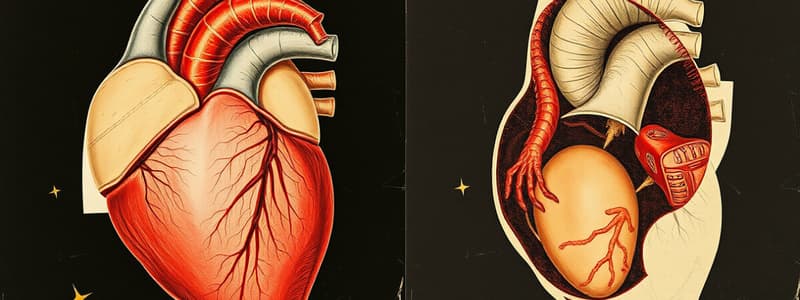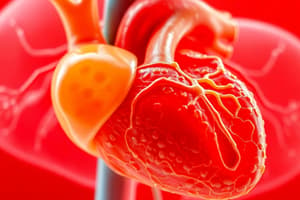Podcast
Questions and Answers
What structure is initially suspended in the pericardial cavity during heart development?
What structure is initially suspended in the pericardial cavity during heart development?
- Myocardium
- Sinus Venosus
- Heart tube (correct)
- Epicardium
What role does the epicardium play in heart formation?
What role does the epicardium play in heart formation?
- It aids in the thickening of cardiac jelly.
- It forms the myocardium.
- It forms the endothelial lining of the heart.
- It is responsible for the formation of coronary arteries. (correct)
Which structure does the heart tube eventually connect to create a single unit?
Which structure does the heart tube eventually connect to create a single unit?
- Sinus Venosus
- Pericardial cavity
- Dorsal aorta
- Transverse pericardial sinus (correct)
What forms the cardiac jelly during heart development?
What forms the cardiac jelly during heart development?
What part of the heart formation process does the dorsal mesocardium contribute to?
What part of the heart formation process does the dorsal mesocardium contribute to?
At which stage does the central nervous system grow cranially affecting heart development?
At which stage does the central nervous system grow cranially affecting heart development?
Which region contributes to the cranial pole of the heart tube?
Which region contributes to the cranial pole of the heart tube?
What is the primary composition of cardiac jelly?
What is the primary composition of cardiac jelly?
What structure remains smooth-walled during the early stages of heart development?
What structure remains smooth-walled during the early stages of heart development?
Which part of the heart becomes trabeculated during cardiac looping?
Which part of the heart becomes trabeculated during cardiac looping?
At approximately what time during embryonic development does the sinus venosus receive blood from the two sinus horns?
At approximately what time during embryonic development does the sinus venosus receive blood from the two sinus horns?
Which veins are responsible for supplying blood to the sinus venosus?
Which veins are responsible for supplying blood to the sinus venosus?
Which part of the heart tube is initially located on the right side of the pericardial cavity?
Which part of the heart tube is initially located on the right side of the pericardial cavity?
What structure is formed from the primitive right ventricle during development?
What structure is formed from the primitive right ventricle during development?
What significant transformation occurs to the ventricle during the development of the heart?
What significant transformation occurs to the ventricle during the development of the heart?
What does the bulboventricular flange indicate in heart development?
What does the bulboventricular flange indicate in heart development?
What is the most common congenital cardiac malformation?
What is the most common congenital cardiac malformation?
What typically happens to most VSDs in the muscular region as the child matures?
What typically happens to most VSDs in the muscular region as the child matures?
Which type of VSD is usually considered more serious and associated with partitioning abnormalities?
Which type of VSD is usually considered more serious and associated with partitioning abnormalities?
What is the incidence of persistent truncus arteriosus in births?
What is the incidence of persistent truncus arteriosus in births?
What anatomical feature results from the failure of conotruncal ridges to form?
What anatomical feature results from the failure of conotruncal ridges to form?
What is commonly associated with persistent truncus arteriosus?
What is commonly associated with persistent truncus arteriosus?
What may happen to blood flow in the pulmonary artery versus the aorta depending on the size of a VSD?
What may happen to blood flow in the pulmonary artery versus the aorta depending on the size of a VSD?
Where do most ventricular septal defects (VSDs) occur?
Where do most ventricular septal defects (VSDs) occur?
What is the primary genetic cause of hypertrophic cardiomyopathy?
What is the primary genetic cause of hypertrophic cardiomyopathy?
Which mechanism is primarily disrupted in hypertrophic cardiomyopathy leading to cardiac hypertrophy?
Which mechanism is primarily disrupted in hypertrophic cardiomyopathy leading to cardiac hypertrophy?
How is ventricular inversion characterized in terms of ventricular and atrial connections?
How is ventricular inversion characterized in terms of ventricular and atrial connections?
Which statement correctly describes the blood flow in hypoplastic right heart syndrome?
Which statement correctly describes the blood flow in hypoplastic right heart syndrome?
What is the inheritance pattern of hypertrophic cardiomyopathy?
What is the inheritance pattern of hypertrophic cardiomyopathy?
During which developmental process does ventricular inversion occur?
During which developmental process does ventricular inversion occur?
What percentage of mutations associated with hypertrophic cardiomyopathy target the B-myosin heavy-chain gene?
What percentage of mutations associated with hypertrophic cardiomyopathy target the B-myosin heavy-chain gene?
Which condition is sometimes referred to as L-transposition of the great arteries?
Which condition is sometimes referred to as L-transposition of the great arteries?
Which structure is formed immediately adjacent to the cranial end of the primitive streak?
Which structure is formed immediately adjacent to the cranial end of the primitive streak?
Which part of the heart is developed from the Left and Right Primary Heart Field?
Which part of the heart is developed from the Left and Right Primary Heart Field?
What is the anatomical location of the septum formation in the atrioventricular canal by the end of the 5th week?
What is the anatomical location of the septum formation in the atrioventricular canal by the end of the 5th week?
At which stage do the Progenitor Heart Cells migrate cranially?
At which stage do the Progenitor Heart Cells migrate cranially?
What type of valves are formed within the heart development as part of the 5th week process?
What type of valves are formed within the heart development as part of the 5th week process?
What is the primary purpose of the septum that forms in the truncus arteriosus and conus cordis?
What is the primary purpose of the septum that forms in the truncus arteriosus and conus cordis?
Which arteries are part of the arterial system developed during the heart's development?
Which arteries are part of the arterial system developed during the heart's development?
Which structures form a horseshoe-shaped cluster of cells during heart development?
Which structures form a horseshoe-shaped cluster of cells during heart development?
Flashcards are hidden until you start studying
Study Notes
Development of the Heart
- Progenitor Heart Cells primarily located in the epiblast at the cranial end of the primitive streak.
- Formation of key structures includes cardiac septa, left atrium, pulmonary vein, and atrioventricular valves.
- Septum formation occurs in various areas, including the common atrium and ventricles, during the 5th week of development.
Cardiac Looping and Structure
- The heart tube develops proper orientation and validation after looping.
- Bulbus cordis transforms from smooth to trabeculated as it differentiates into the right and left ventricles.
- The separation of chambers and valves facilitates organized blood flow.
Sinus Venosus Development
- Receives venous blood via the right and left sinus horns by the middle of the 4th week.
- Important veins contributing blood include the vitelline vein, umbilical vein, and common cardinal vein.
Vascular Development
- The formation of the arterial system includes vital structures like vitelline, umbilical, and coronary arteries.
- The venous system begins forming in the 5th week, contributing to the cardiogenic region.
- Blood vessels at both ends of the developing heart play a critical role in support and function.
Hypertrophic Cardiomyopathy
- Caused by mutations in genes regulating sarcomere proteins, inherited as an autosomal dominant trait.
- Affects cardiac muscle organization resulting in hypertrophy, with implications for cardiac output and conduction.
Ventricular Inversion
- A defect where the left ventricle is morphologically located on the right side, leading to mitral valve connection to the right atrium.
- Abnormalities develop during laterality specification; associated with tricuspid valve displacement.
Ventricular Septal Defects (VSDs)
- Common congenital malformations, occurring at a rate of 12/10,000 births.
- Majority (80%) happen in the muscular region and often resolve naturally, while membranous VSDs present more serious concerns.
Persistent (Common) Truncus Arteriosus
- Results from failure of conotruncal ridges to divide the outflow tract, occurring at a frequency of 0.8/10,000 births.
- Accompanied by defects in the interventricular septum, significantly impacting circulation.
Studying That Suits You
Use AI to generate personalized quizzes and flashcards to suit your learning preferences.




